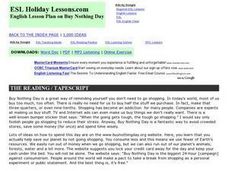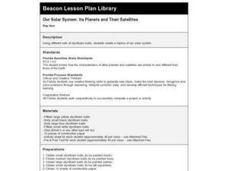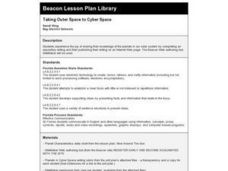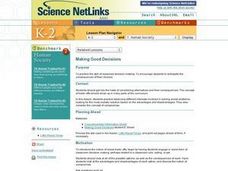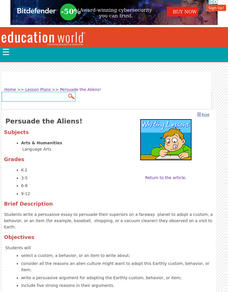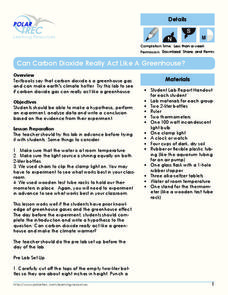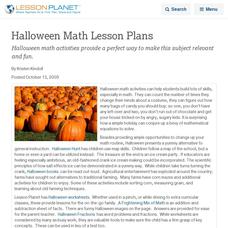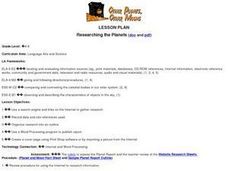Curated OER
If I Were a Planet..
In this planet worksheet, students choose imagine they are a planet and complete a total of 5 short answer questions. Worksheet contains a link to additional activities.
Curated OER
ESL Holiday Lessons: Plan on Buy Nothing Day
In this ESL holiday lesson worksheet, students read a passage about Buy Nothing Day, then complete a variety of comprehension and vocabulary activities.
Curated OER
Power Point Slide Show
Students use a website to gather information about a planet and its moons. They work in small groups to plan a slide show presentation on a planet and its moon using a Power Point Template.
Curated OER
A Tour of Saturn and Uranus
Second graders draw and label each planet, Saturn and Uranus, showing 2 specific individual characteristics of each.
TED-Ed
Tycho Brahe, the Scandalous Astronomer
Who says scientists are boring geeks? Certainly not the narrator of a short video who dishes up the scandals associated with Tycho Brahe, a Danish scientist and alchemist (now that's two labels you don't often see together) who used...
Curated OER
Our Solar System: Its Planets and Their Satellites
Fourth graders create a replica of our solar system. Each group arranges the balls in the proper order for our solar system by gluing them to the construction paper. Under each of the balls, the name of the object should be clearly printed.
Curated OER
Taking Outer Space to Cyber Space
Use the Internet, write an expository text, and have students share their knowledge of the planets in our solar system. They compose an expository writing piece and publish it to a web page.
Curated OER
Making Good Decisions
Students consider alternative decisions and consequences. In this decision making lesson, students role-play in a social problem. They look for a realistic solution based on advantages and disadvantages.
Curated OER
Persuade the Aliens!
Why do we do what we do? Imagine that people on a faraway planet came to visit Earth. Could you convince them to adopt a custom or behavior that we participate in here? Learners of all ages write persuasive essays. If you're using this...
Curated OER
Sand Travels
Students examine how sand is formed by erosion and that it can be moved by streams, rivers, and ocean currents in this unit of lessons. They study waves and currents, and structures that change how sand moves by creating story charts,...
Curated OER
“THE LORAX” by Dr. Seuss
Few children's books convey the message of conservation as well as Dr. Seuss' The Lorax. Read the story aloud, emphasizing the interconnectedness of plants and animals in an ecosystem and discussing different ways people can help the...
Curated OER
Recycled Paper
Sixth graders keep track of the amount of paper they consume on a daily, weekly, and monthly basis. The goal of the lesson is to have them all find ways to reduce the amount they use. Everyone creates recycled paper from old newspapers...
Curated OER
Appearances Are Deceiving
Young scientists study creeks around their area to see how clean the water really is. One way to tell is by the invertebrate populations that are present. This activity introduces a game which learners simulate a variety of species found...
Curated OER
The History of Life on Earth
Using meters as years, your class works together to map out the geologic time scale on a football field. Plenty of background information is included in this lesson plan as well as several resource links and a student worksheet. Your...
Curated OER
Slip Slidin' Away
Students investigate mechanical weathering as a form of erosion. In this erosion lesson, students, define weathering and erosion before determining how the Earth's surface is in a constant state of change. They watch a video, access...
Polar Trec
Can Carbon Dioxide Act Like a Greenhouse Gas?
Ninety-seven percent of scientists who study climate agree that human activity is warming the planet. Learners explore carbon dioxide as a greenhouse gas, a gas causing this warming, through a hands-on experiment. Once complete, they...
Population Connection
Meeting Human Needs
How to meet the needs of people around the globe—a question many ask. The fifth in a six-part series about human population and its effects on the globe, the eye-opening lesson includes discussion, a homework activity, and an in-class...
Starry Night Education
The Stars
Three astronomy activities in one resource! Here you will find one hands-on activity, one demonstration, both with discussion questions, and one activity worksheet. During these lessons young scientists discuss how stars are different,...
Curated OER
Mass vs. Weight
Why do you weigh more in space? Each individual in your class explores this question and others as they determine the mass and weight of different objects using two types of scales. They perform conversions and discuss their results,...
Curated OER
World In Motion Curriculum
Middle schoolers explore the night sky and its solar system. Using a Digitarium planetarium system, students observe four constellations. They discover the phases of the moon and eclipses. Middle schoolers recognize the difference...
Curated OER
"101 Amazing Earth Facts" Game
Students read for comprehension, work cooperatively to learn "101 Amazing Earth Facts," and compete as teams in a Jeopardy-like game.
Curated OER
Halloween Math Lesson Plans
Halloween math activities provide a perfect way to make this subject relevant and fun.
Curated OER
Researching the Planets
Young scholars use a search engine and links on the Internet to gather research. They record data and cite references used. They organize research into an outline and use a Word Processing program to publish a report.
Curated OER
Compare and Contrast Planets Using a Venn Diagram
Learners use the Venn diagram template to complete the assignment or prepare their own Venn diagram using the Draw program on their computer (if available). They share their Venn diagrams with the class.



